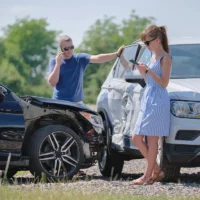The Importance of Eyewitnesses in a Personal Injury Case

The day started like any other, but suddenly, you were in an auto accident. It happens to Alabamians almost every day. There will be an initial shock at what just happened. Your mind scans your body – are you okay? Is the other person? Now what?
Getting medical help to the scene should be the priority of anyone involved in a personal injury, whether an auto, motorcycle, bicycle, truck, pedestrian accident, a slip and fall, or an accident at work.
But if you are not seriously injured while you wait for law enforcement to arrive, remember that an eyewitness to what just happened will make all the difference when it comes to eventually establishing fault.
A statement from the two parties involved in a personal injury is not nearly as valuable as an independent third party’s version of what happened, at least in the eyes of a jury.
According to Alabama personal injury attorney J. Allan Brown, whether before a judge, jury, or an insurance adjuster, establishing fault is the key to being awarded damages by the at-fault party.
What is an Eyewitness?
An eyewitness is an uninvolved and neutral third party who witnessed the accident.
If you can, you should act at the scene, when memories are freshest, to get a third party’s version of what happened.
You may want to:
- Check the street corners, stores, and anyone standing around.
- Ask anyone in a car driving by at the time.
- Maybe a Good Samaritan pulled their car over to help the injured. Under the Alabama Good Samaritan Act, they are immune from civil liability.
- Check for any street cameras or storefront cameras. Tell the police about their existence and take a photo of the camera.
- Determine if the witness saw the entire incident or turned to witness it only after they heard the sound of a collision.
Ensure you get the eyewitness’s contact information, take a photo of them and their license, and ask the witness to write down what they saw. Make sure they have no biases that might eliminate them as a good witness.
For example, if someone were injured when they slipped and fell on a spill in a store, the store manager who witnessed the accident would not be a good witness because of his conflict of interest. He never cleaned up the spill that had been there for hours.
Who is Not a Good Eyewitness
Make sure your eyewitness is credible. When they testify, it must be truthful under the penalty of a Class C felony or perjury.
If you were in one of the cars involved in a crash, you have an obvious incentive to tell your version of the accident. You may say it was entirely the other person’s fault, but you are not unbiased.
The judge or jury should hear that from someone with no interest in the case’s outcome.
Besides someone with a conflict of interest, others who do not make good witnesses include:
- Someone on their phone during the crash.
- Someone distracted by children or dogs.
- Someone who was walking in the other direction.
- Someone with a criminal background.
- Someone who had a headset on.
- Someone with poor vision.
- Someone in poor health with memory problems and poor eyesight, and someone very young.
Once established, ask them if they could tell you what they saw. Have them write it down. It’s important.
Ultimately, the person with the most persuasive witness will have the best chance of securing a favorable settlement from the other side before or at trial.
Your Alabama Auto Accident Attorney
During an initial complimentary consultation, personal injury attorney J. Allan Brown will gather all the facts, including talking to any eyewitness to the accident. Mr. Brown will determine if conflicts exist or if the witness himself might be less-than-ideal.
Mr. Brown suggests you not speak to a representative from the other side’s insurer. That person may present as very friendly and wants to find you compensation. But he is not on your side; he is on the side of the insurance company, one of the most profitable businesses in the world, largely because they underpay accident claims.
Be mindful that anything you say to the insurance adjuster or the other person in the accident may eventually be used against you.
With a successful personal injury claim, compensation may be available to cover your medical losses, the cost of ongoing therapy, lost wages, and pain and suffering.
Call Mr. Brown and let him put his decades of compassionate experience to work for you. Our office number is (251) 473-6691, and the initial call is complimentary.




